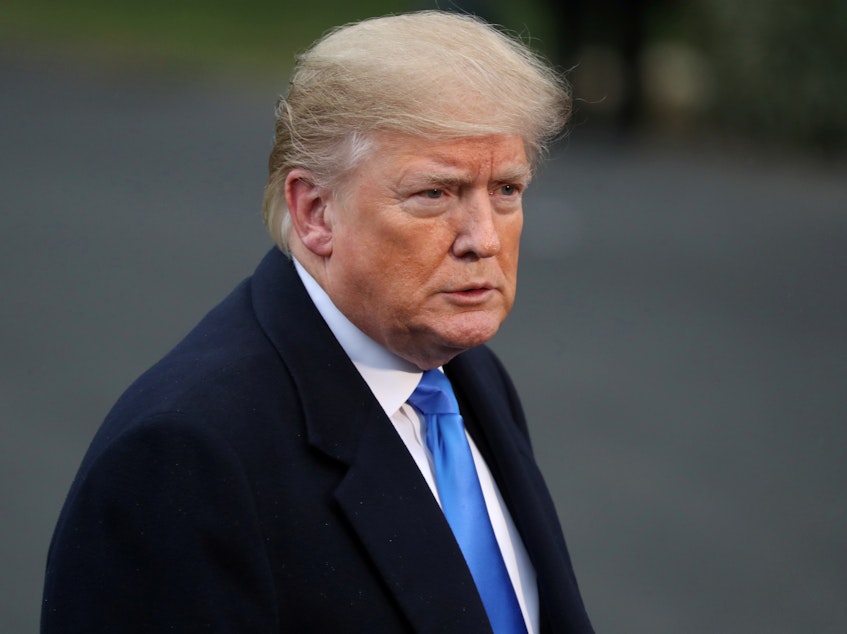Trump Says He Will Void Birthright Citizenship Law Through Executive Order

President Trump is planning to use an executive order to strip birthright citizenship from America's laws, rather than trying to change the Constitution through an act of Congress. The potential move, which would likely trigger numerous legal challenges, would seek to end the conferring of citizenship to children of non-citizens who are born in the U.S. — which is currently guaranteed by the 14th Amendment.
"It was always told to me that you needed a constitutional amendment. Guess what? You don't," Trump said. He discussed the plan in an interview with Axios on HBO that is slated to air Sunday.
Birthright citizenship is granted in the 14th Amendment's first sentence: "All persons born or naturalized in the United States, and subject to the jurisdiction thereof, are citizens of the United States and of the State wherein they reside."
The concept is based on jus soli — "right of the soil" — meaning that any child born in the U.S. has a claim to citizenship, even if their parents lack legal documentation to be in the country.
Trump has mentioned the idea of voiding the amendment before, most notably in August of 2015, when the birthright issue became part of his hard-line policies on immigration as a presidential candidate. Now Trump is discussing the birthright citizenship law roughly one week before U.S. voters will head to the polls for the 2018 midterm election.
Sponsored
The amendment became law in 1868, as a rebuke to the Supreme Court's Dred Scott decision, which held that freed slaves were not U.S. citizens. Since then, its meaning and reach have been debated in courtrooms and in American society, with many questions centering on the phrase "the jurisdiction thereof."
"That means that they are subject to the laws of the United States, that they can, for example, be prosecuted for violating American law," constitutional law professor Suzanna Sherry told NPR in 2015.
The law excludes the children of foreign diplomats — and in the 1860s, it was intended to give peace of mind to immigrants.
As Sherry, who teaches at Vanderbilt University, told NPR in 2015, "the United States had experienced quite a bit of immigration, and immigration was viewed as a very good thing. And so this was essentially putting out a welcome mat to immigrants by ensuring that their children born here would be citizens."
To change the law, Sherry said, you would need to either amend the 14th Amendment through Congress or ask the Supreme Court to overturn their earlier interpretation of the law and limit its benefit to people who are in the U.S. legally.
Sponsored
The president says he has the power to act on his own.
"You can definitely do it with an act of Congress," Trump said in the Axios on HBO interview. "But now they're saying I can do it just with an executive order."
He added, "We're the only country in the world where a person comes in, has a baby, and the baby is essentially a citizen of the United States for 85 years, with all of those benefits. It's ridiculous. It's ridiculous, and it has to end."
Birthright citizenship is the law of at least 30 countries, including many of the U.S.'s neighbors in North and South America. All of the countries in Europe grant citizenship by jus sanguinis — by "right of blood."
The president said he has spoken about the issue with the White House counsel. As for when it might happen, Trump said, "It's in the process. It'll happen — with an executive order."
Sponsored
Responding to the president's words, Mark Krikorian, the executive director of the Center for Immigration Studies, predicted, "This will set up the court fight."
CIS identifies itself as a nonpartisan think tank, but it has called for tougher U.S. immigration policies, and the Southern Poverty Law Center has designated it a hate group.
If Trump moves ahead with his plan, Krikorian said via Twitter, "the order will be enjoined, case will eventually reach SCOTUS, which then will finally have to rule on the meaning of "subject to the jurisdiction."
Critics of birthright citizenship have said it encourages pregnant women who want to immigrate to travel to the U.S. to have their babies, hoping to gain citizenship for their children and potentially ease their own path to becoming U.S. citizens.
While it's difficult to track the exact number of children whose parents are in the U.S. illegally, the Pew Research Center has reported that in 2014, 3.2 million children — nearly 6 percent of all K-12 students in the U.S. — had at least one unauthorized immigrant parent and were citizens because they were born in the U.S.
Sponsored
Krikorian said the executive order is "long overdue" — but Trump's idea to revoke birthright citizenship is "ill-timed" and misguided, says Kristen Clarke, the executive director of the Lawyers' Committee for Civil Rights Under Law.
"Aside from being unconstitutional, such an executive order would exacerbate racial tensions, exploit fears and drive further polarization across the country at a moment that calls for the promotion of unity and inclusion," Clarke said.
Jess Morales Rocketto, whose Families Belong Together group has fought the Trump administration's family separation policy along the U.S.-Mexico border, was more blunt.
"This is ethnic cleansing," Rocketto said. "This is an attempt to whiteout America's history and heritage as a nation of immigrants. And it's unconstitutional." [Copyright 2018 NPR]



